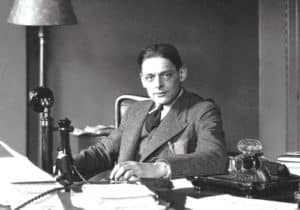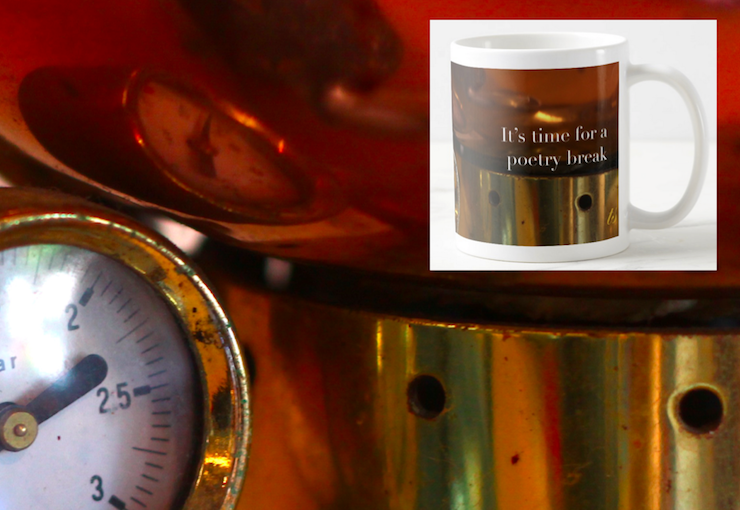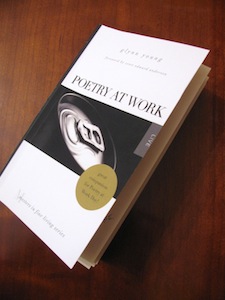Today is Poetry at Work Day 2018.
Most poets have day jobs. They must. Very few poets, no matter how good they are, no matter how much their words may leave us struck with wonder, can make a living solely by writing poetry.
Walt Whitman, for example, struggled financially for most of his life. He was a printer, a teacher, a journalist, a newspaper publisher, and a clerk in the Department of Interior in Washington. Maya Angelou was a dancer, a songwriter, a singer, a historian, a civil rights activist, a producer, and a director. Wallace Stevens and Edgar Lee Masters were both attorneys. William Carlos Williams was a doctor. Marianne Moore was a teacher and editor. T.S. Eliot was a banker and an editor. Robert Frost was a teacher, cobbler, and editor.

Marianne Moore at the offices of The Dial
A few poets have had the good fortune of being supported by family money (think Emily Dickinson) or by a working spouse. Many more can be found teaching at universities (Scott Cairns) or working for literary magazines (which can’t be the most lucrative of careers). The reality for the vast majority of poets, past and present, is that they must have a day job.
This is not necessarily a bad thing. Stevens seemed to like his legal work for the Hartford Insurance Company, so much so that he turned down an appointment at Yale arranged by well-meaning friends appalled at the idea he had to do lawyerly work. Caught up in romantic notions of what poetry should be and how poets are supposed to live and work, we forget that the work we do has intrinsic value, that our work has its own poetry.
That’s the idea behind my 2013 book Poetry at Work. I found the poetry in my work because my work had value. In fact, one can read that book as a memoir of working for a company for more than 30 years. I borrowed the idea from William Carlos Williams, who believed that his work—medicine—worked hand in hand with poetry (an article on Williams, his medicine, and his poetry by a neurologist was published in 2012 in the Journal of the Royal College of Physicians).
Here is “Complaint,” written by Williams in 1921:

William Carlos Williams at work
They call me and I go.
It is a frozen road
past midnight, a dust
of snow caught
in the rigid wheeltracks.
The door opens.
I smile, enter and
shake off the cold.
Here is a great woman
on her side in the bed.
She is sick,
perhaps vomiting,
perhaps laboring
to give birth to
a tenth child. Joy! Joy!
Night is a room
darkened for lovers,
through the jalousies the sun
has sent one golden needle!
I pick the hair from her eyes
and watch her misery
with compassion.
Poetry can’t really be separated from the work we do because poetry is inherent in the work we do.
We have a challenge for Poetry at Work Day 2018.
Say you have a friend who works in insurance sales. She’s skeptical about this poetry at work stuff, so she rather slyly asks you to recommend a poet she might read. What would you recommend?

T.S. Eliot, banker
What about a truck driver? A school district administrator? A human resources director? A policeman? A stockbroker? A city council member or other elected official? What might you say to a psychiatrist, an auto mechanic, an undertaker, a grocery store clerk, or a photographer? What poet or poetry would you recommend to a flight attendant, a train engineer, a research chemist, or a soldier? What would you say to a brand-new mother who had 45 minutes of sleep last night with a colicky new baby?
Select from these or any other kinds of professions or work and suggest a poet, a collection of poetry, or a number of poets or poems. Write your answers in the comments. We’ll select two or three to receive a free copy of Poetry at Work. Winners will be announced next Tuesday.
And, to celebrate today, consider reciting a poem for work, or at work. Leave a copy of a poem in the break room. Write a poem about the work you’re doing today.
And look for the poetry in the work you do. It’s there. You can find it.
Related:
Download the free Poetry at Work 2018 poster
Poster photo by Sonia Joie, used with permission.
___________________
Get Poetry at Work, the book, by a Fortune 500 leader
Poetry at Work, by Glynn Young, foreword by Scott Edward Anderson
“This book is elemental.”
—Dave Malone
- Poets and Poems: Sandra Marchetti and “Diorama” - April 24, 2025
- Poets and Poems: Christina Cook and “Roaming the Labyrinth” - April 22, 2025
- Longfellow’s “Paul Revere’s Ride”: Creating a National Legend - April 17, 2025


Mary Sayler says
So true, Glynn. Thank you. When I was researching a life-health encyclopedia for Facts on File, I saw such poetry in the shape of bones, connecting tendons, and blood pulsating through the body that poems couldn’t help but happen. Wouldn’t you love to see more poetry by surgeons, neurologists, biologists, and other scientists who believe in our Creator God? Or mathematicians and astronomers focused on the expanding universe God set into motion. Or servants who see people at their best and worse and know what it means to forgive in Jesus’ Name.
Glynn says
Mary, thanks for the comment. I suspect poetry is configured in the structure of the natural world, and in our own DNA.
Mary Sayler says
Exactly! And it’s beauteous.
Katie says
Glynn and Mary,
Appreciate both your comments here.
Glynn thank you for the links. I found this quote when I followed the one for Scott Cairns:
“I’ve come to think of beauty as how God woos us to himself. One doesn’t so much create it or illuminate it as partake of it. Thereafter, one participates, collaborates, in its endless development.”
I also concur with your statement: “Poetry can’t really be separated from the work we do because poetry is inherent in the work we do.”
One of my favorite contemporary writers is Ann Voskamp (1000 Gifts, Be the Gift, The Broken Way). While not a poet per se, her writing is quite poetic. A couple of take-aways from her books for me:
“Maybe the only abundant way forward is always to give forward.”
and “Love is a verb – and that verb is givenness. Love gives. There is no other way to express love apart from givenness. The essence of love is living given.”
Gratefully,
Katie
Glynn says
Thanks for the comment, Katie.
Sandra Heska King says
The electrocardiogram alarms
running her story too fast. Baby eyes
roll up into long lashes. Where has she gone?
. . . The line is flat,
has been for some time,
but we cannot believe, refuse to stop.
When I try to tell the parents,
my tongue is granite . . . ~Constance Studer in “Rose”
Or…
Then, a morning when the patient leaves,
taking his body. The nurse finds nothing
but the bed with its depression,
its map of sheets she strips.
In the drawer, gumdrops. A comb
woven with light hair, and a book
with certain pages marked.
She takes all these into her pockets.
She has trunks in every room in her home,
full of such extraordinary things. ~ Cortney Davis in “The Nurse’s Pockets”
These are excerpts from poems found in “The Poetry of Nursing: Poems and Commentaries of Leading Nurse-Poets” edited by Judy Schaeffer.
Mary Sayler says
Love it, Sandra! Thanks. Here’s my “Brain Case,” first published in Chest medical journal then included in my book Faces in a Crowd:
Brain Case: In Forty-Eight Fluid Ounces
Each day she carries a briefcase of bone
filled with three juicy pounds of secrets
unlocked by forty-eight oz. of wizards.
Every day she holds her mind in origami-
folded wedges of memory and movement.
Some days she does not like the pearl-
sized hypothalamus who seems to have
no real regard for how she wants to feel.
Behind the shell of her forehead, a small
argument forms, but before she can speak,
she must run each debate by Brocha’s area
then await the mysterious transformation
of her fluid thoughts poured into words.
In an eye blink, the occipital section of her
briefcase links images to information, but
the concealed wizards get there first then
tell her only what they’re willing to reveal.
Oh, well. She won’t open the case by herself
anyway. You might as well give her the truth.
Give her purple to drink and pictures drawn
by magnets! Draw her perspective. Draw her to
someone who loves her or, at least, will assess
her attaché case before emptying everything
out. Find a soft handle. Hand her a hanky.
Handle each nerve with a pledge and a glove.
by Mary Harwell Sayler
Glynn says
If there’s anyone who’s a walking poet, it’s a nurse!
Ed Rose says
Some people do crossword puzzles while waiting. I look for a poem.
ER
In the waiting room
List’ning to HGTV
Trying not to breathe.
Ed Rose says
I didn’t understand at first that you were looking for work related poetry. I am retired and it seems like my job last year was caring for others in hospital waiting rooms.
Sandra Heska King says
I think that poem absolutely works, Ed. From many perspectives.
Ed Rose says
Thanks.
Glynn says
I agree – it works, Ed!
Mary Sayler says
Ed, I agree with Sandra. The poem works wonderfully well. Most of us who have spent time in a waiting room will identify, especially in that l-o-n-g wait in an ER.
Kate Jenkinson says
When I was 1 year old my parents separated and made very different choices about how they lived and worked.
The young poet in me captured their impact on my growing up in the following lines:
I had a Mother who had a life and it was her work.
I had a Father who worked and it was his life.
I don’t remember my Father.
I shall never forget my Mother.
What legacy will you leave for your children, your team at work? Will they forget you or remember you once you’ve gone?
Ed Rose says
Prescription called in.
Pharmacist works while I wait,
Writing poetry.
(One of my favorites)
Glynn says
Kate, I believe the most important work we have is our children. Even with two grown sons, I’m never not a father. Thanks for the comment.
Ed Rose says
Prescription called in.
Pharmacist works while I wait,
Writing poetry.
One more to share. Thanks.
Katie says
This is what I would say to that new mom with the colicky baby who got only 45 minutes of sleep the night before:
Too bad, isn’t it –
that we can’t sleep
while standing?
How can you
walk miles and
miles inside your house?
I could make
the circuit blindfolded:
baby’s room,
hall,
bed room,
bathroom,
hall
kitchen,
dining room,
living room –
repeat, repeat, repeat.
Why can’t he sleep?
What else can I do?
When will he sleep?
Where should I go
next –
Rocker,
Recliner,
Refrigerator?
Sleep, baby,
pleeease sleep –
before I need diapers too!
Katie says
To the Brand-New Mom, Part 2
While you’re sure
your legs will
go no farther,
When you know
your eyes will
not stay open,
Why – you’ve sung,
even prayed –
and cried,
Where can I
ever find the
strength and patience,
What am I
going to do
Lord, with this gift?
How can I
ever be the
mom he needs?
Okay –
I hear ya,
Cling to You,
just like my little one
clings to me.
Glynn says
Yes, I connect with this. Our youngest had colic for a good seven months.
Marcus G. Taylor says
SOP: Follow standard operating procedure
That was in our group email today
Highlighted to stand apart from what the office has to say
Personally, i pretend i listen to it a lot
Really, i gave up trying to figure what the email is about
SOP: Follow standard operating procedure
Capture this class in real time so that it can be stockpiled
But record it how the office says; avoid your own freestyle
Check your feeds and backups in case something fails
If it does, expect a barrage of calls and emails
SOP: Follow standard operating procedure
It reminds of stop. Like stop your calling for light checks
Do favors a million dollar university but get paid in specks
Phone call. Your schedule changed. Record the next class.
Wreck your lunch time. This assignment came from the upper brass
SOP: Follow standard operating procedure
Another email: be sure to fill out the course description
Do it by week’s end or it will affect your position
Meanwhile, i completely missed what the professor said
I messed up the procedure.
Instead of recording his content, i recorded a talking head.
Another email. SOP: Follow standard operating procedure